It is very difficult to tell if pigeons are dying or not unless you find one that has obviously been wounded.
External injuries are easy to spot, but there are many other signs a pigeon is dying.
Unless you come across a wild pigeon on the ground, it is doubtful that you would see one in the actual process of dying.
Sick pigeons will hide away from prying eyes because they feel vulnerable in their weakened state.
It is different in the case of captive pigeons or those that live in a loft.
As an Amazon Associate we may earn a small commission on purchases made through any Amazon links, this helps support us, thankyou.
About to buy your first pigeon?
Click to view essential products to help you take the best care of them:
Pigeon keepers are very attentive and have concern for the health of their birds.
This constant care will help you recognize the signs that indicate that a pigeon is dying.
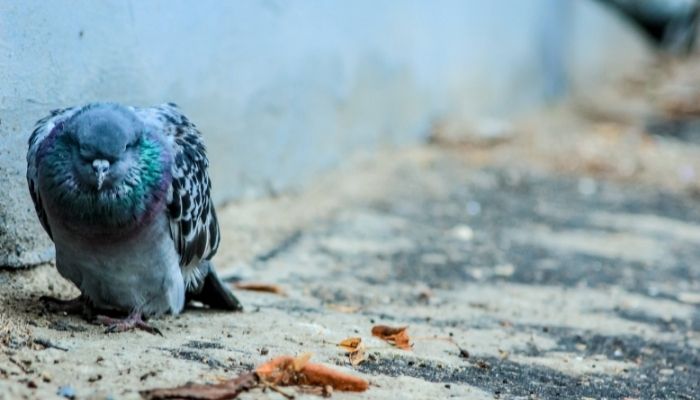
Signs to look for:
1. Inactivity
Most pigeons are very active. Only when they roost or are brooding do they seem quiet and relaxed.
They strut around, fidget, bob their heads, and burst into sudden flight all the time.
They are also a social, quarrelsome, and noisy bunch when in a flock.
Any change in their normally exuberant behavior is cause for concern.
2. Self-Isolation
One sure sign of failing health is isolation.
Pigeons are gregarious and it isn’t often you see one alone.
A lone pigeon may fly off to scout around and look for other sources of food, but other than that, they are usually found with others.
If one keeps itself apart from the others of the flock, in the cage or loft, then it may well be dying or at least very sick.
3. Lethargy
Pigeons are bundles of energy. They may perch or roost for short periods, but they don’t tend to stay inactive for very long.
Even when they are at a standstill, they ruffle their feathers, shift their feet and look around continuously.
If a pigeon doesn’t exhibit this behavior, then it may well be dying.
4. Loss of Appetite
These birds are gluttons. They don’t seem to stop eating and drinking.
Pigeons have a very high metabolic rate and constantly need to ingest food to fuel their bodies.
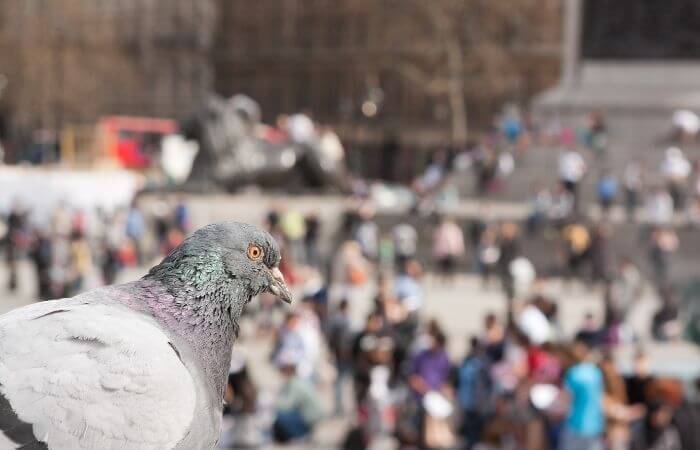
As they don’t have stomachs and their gullets are very small that means the constant swallowing of food.
If a pigeon isn’t constantly looking for food and eating, then there is something very wrong with them.
This lack of interest in food indicates that if not very sick, then they are probably dying.
5. Sleeping
Pigeons may take periodic naps when they perch someplace for a while, but longer naps or more frequent sleeping could be the cause of failing body functions which is leading to death.
If they are not up and about with the other birds, then something is definitely amiss.
6. Diarrhoea
One good indicator is the consistency of their droppings.
Pigeon poop is usually a mix of solid and liquid waste.
If their droppings are constantly of the liquid type, then their internal organs may not be working correctly.
The liquid feces will probably have a greenish color too.
This can be a sign of their body decaying due to rapidly failing health.
7. Irregular Moulting
Healthy pigeons have shiny feathers.
Especially, many have an iridescent sheen around the neck feathers.
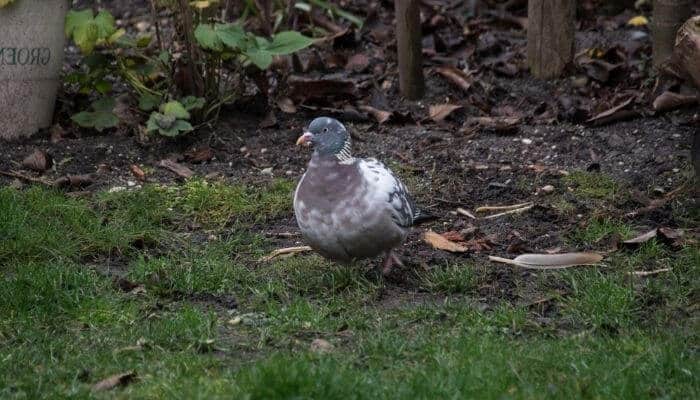
Moulting is also a natural process in a pigeon’s life cycle.
If a bird’s plumage is looking dull or feathers are falling out and not being replaced, it is a sign that your bird isn’t in the best of health.
Bald spots may appear.
This condition may signal that the bird is dying.
8. Difficulty in Moving
A pigeon may find it difficult to move.
Because of swelling joints, they may lose articulation in their wings and legs.
Locomotion may be impaired because of swelling feet too.
This can be accompanied by flaking skin.
9. Disease
It is a popular myth that pigeons are disease-ridden, but that isn’t true.
Pigeons aren’t prone to more diseases than any other avian species.
Some common pigeon diseases are curable, whereas others aren’t.

Many of the signs mentioned above may be symptoms of a fatal disease that your bird has caught.
10. Breathing Difficulties
If you notice a pigeon suffering from breathing issues, this could well be due to a fatal respiratory disease.
A number of pigeon diseases have labored breathing as a symptom, for example, ornithosis.
11. Foot Abnormalities
The constant shifting from foot to foot, unequal nail growth, loss of toes and swelling in the feet, and other abnormalities are a clear indication of a sick pigeon.
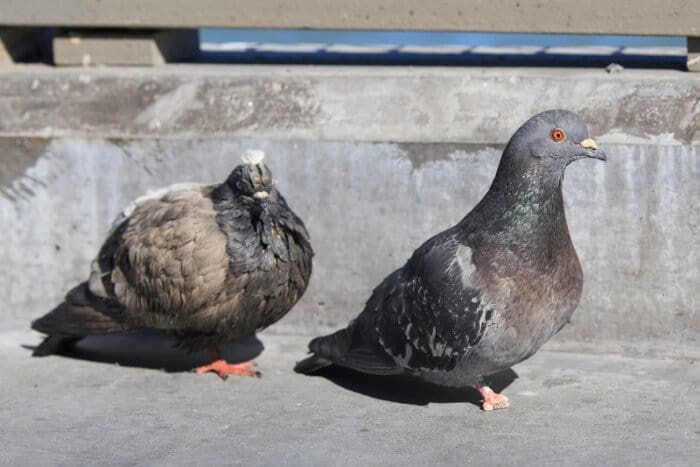
12. Loss of Vision
Pigeons have excellent eyesight but some diseases may affect their vision.
It might be evidenced by inconsistent blinking, watery eyes, bumping into things and general dizziness.
Unless the loss of vision is naturally age-related, there may be an underlying disease with other symptoms.
13. Age
Simple old age may be the reason that your pigeon is dying.
Estimates of feral pigeon mortality range from 2-6 years, depending on what authority you choose to believe.
Captive pigeon longevity is said to be between 9-15 years.
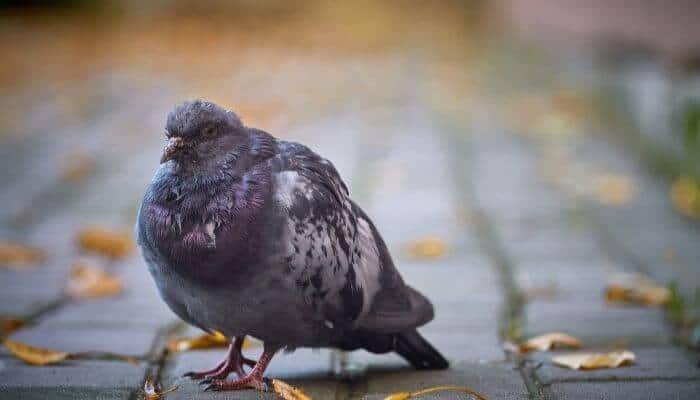
Some pigeons can last up to 20 years in captivity.
Only if you know when your bird was hatched will you know its age.
It may well be dying just because of natural old age.
How to Comfort a Dying Pigeon?
Even if from all the signs you’ve noticed, you think a bird is dying, it is best to get veterinarian confirmation.
The vet may be able to prescribe medication to prevent death or may advise it is best to euthanize the bird to prevent further suffering.
You may be an experienced pigeon owner who knows very well that a bird is near the end and wish to make its last days as comfortable as possible.
A dying bird needs to be treated with compassion.
Firstly, it should be isolated from all the other birds in a loft.
This reduces the risk of any disease being passed on and also reduces stress on the flock.
Keep the bird warm and coax it to eat some food and take water but don’t force it because this will just agitate or traumatize the bird.
Take the proper steps for the disposal of a dead bird when fate takes hold.
In Conclusion
If your pigeon exhibits any of the signs mentioned here, then your bird may be dying.
To be sure you should consult a veterinarian that specializes in avian medicine.
At the very least, any of these signs will tell you that your bird is out of condition and may be suffering from a disease.
In that case, the bird should be isolated immediately to stop the spread of a commutable illness through your loft.
Birds that cannot be saved should be culled immediately, to put them out of their misery.
If you come across an injured wild pigeon, or one you think is sick, the best thing to do is contact a pigeon-friendly rescue center for advice.
